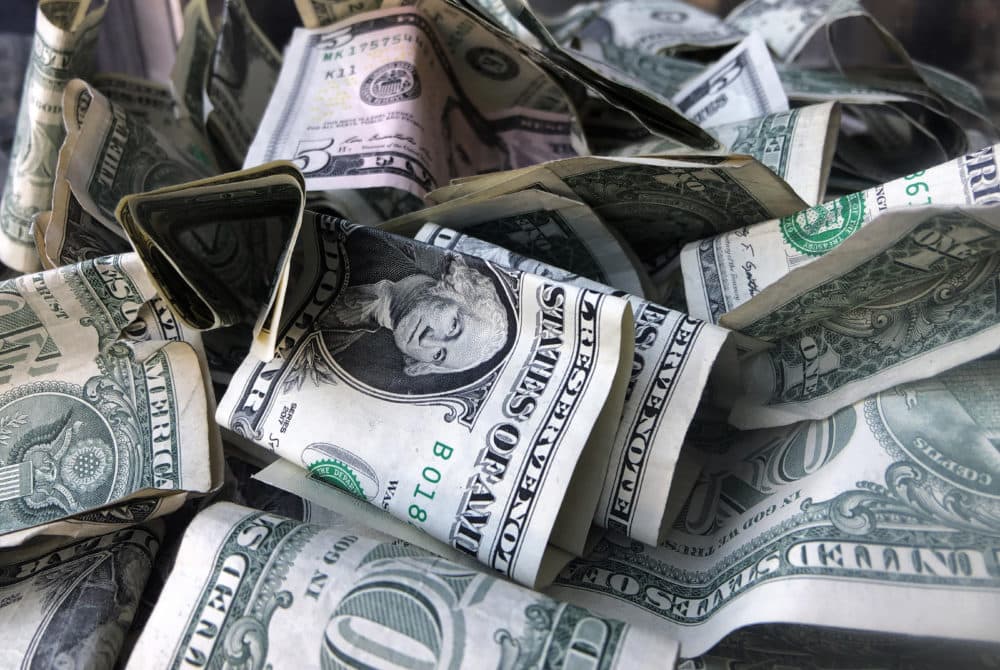Advertisement
How the strong U.S. dollar is hurting the global economy
Resume
Sign up for the On Point newsletter here.
America’s economic challenge now is high inflation. The rest of the world’s is high inflation — and a strong U.S. dollar.
"The dollar has definitely been on a tear. Recently, the euro fell below the value of the dollar," Kenneth Rogoff says. "The pound used to be worth two and a half times what the dollar is."
So, economies around the world are taking a beating. It could get worse for them.
"If it went up another 10% or 15%. Something got worse in the war in Ukraine, something scared everybody," Rogoff adds. "The dollar could go up more and become as bad as back in 1985."
That year, the dollar was intentionally devalued.
"If you're in the White House and something we're doing is really causing a world recession, leading to civil unrest, wars and stuff, you certainly should think about that," Rogoff adds.
Today, On Point: The price of the strong dollar.
Guests
Kenneth Rogoff, chair of international economics at Harvard University. Former chief economist at the International Monetary Fund. Author of The Curse of Cash. (@krogoff)
Jean-Claude Trichet, former president of the European Central Bank.
Also Featured
Garrie Deadman, owner of the TasteAmerica food store in Tonbridge in England.
How The Strong U.S. Dollar Is Impacting This Business Owner
GARRIE DEADMAN: My name's Garrie Deadman. I'm the owner of TasteAmerica, an American Grocery Store in England."
KIMBERLY ATKINS STOHR: Garrie's store is in the English town of Tonbridge, about 30 miles southeast of London. He sells grocery items he imports from the U.S.
DEADMAN: People like to buy a pumpkin pie. They like to buy coffees. We sell a large selection of American teas, barbecue sauces, cereals, food seasonings, ice cream toppings, popcorn, seasonings, marshmallows, all sorts of products.
ATKINS STOHR: His customers are people looking for more variety, more choice.
DEADMAN: If you look to an English grocery store ... for coffee, you probably have a selection of ten coffees.
Now, if you go to an American store and you look down across the aisle, you've probably got a selection of 200. And there's all weird and crazy flavors like, you know, peppermint, mocha, pumpkin spice.
And we just don't get that here. We get regular coffee; we might get a hazelnut. You're very lucky to see something like a French vanilla.
ATKINS STOHR: But some large economic forces have been hurting his business.
DEADMAN: We're being hit by, first of all, the cost of the goods out of the U.S.
Inflationary costs are going up about 15% to 25% on groceries. Then we have the added cost of the shipping, which has gone through the roof. Because one, we pay in dollars for the shipping. The ship has also got high cost of oil at the moment.
And then on top of that, just this year, we're losing 20% on the exchange rate of the pound vs. the dollar.
ATKINS STOHR: That's what a surging dollar on the currency exchange markets means for Garrie, a drop in the value of the British pound.
DEADMAN: So, for example, we bring in something like commercial Crisco oils, which may have cost us like $10. The costs have gone up about 25% in the U.S., so, you know, about $12.50.
Now, if you add in the exchange rate drop, instead of us paying around $12 with the exchange rate before, we're probably paying about $14 to $15.
ATKINS STOHR: Worse, in hard times, he can't pass the increased costs onto his customers. If he did, they'd just go back to plain old English coffee and somehow get through fall without a pumpkin pie spice latte.
So, the strong dollar is cutting deep into his profits. Meanwhile, Garrie is looking to the holidays and wanting nothing more than a better exchange rate.
DEADMAN: We're hoping we can get through to Christmas. We have a strong Christmas, we hope. ... I'm sure there's a lot of companies in the U.S. probably struggling as well because of the drop in their sales exporting. And so it's a double-edged sword.
This program aired on October 21, 2022.

